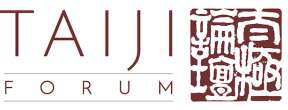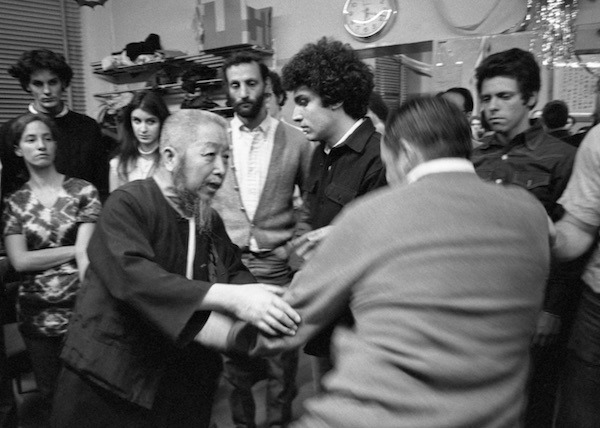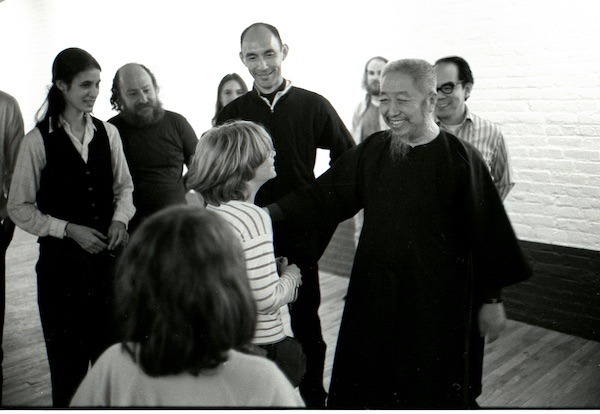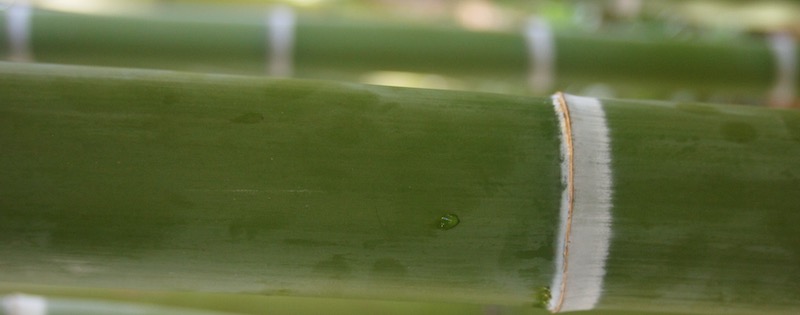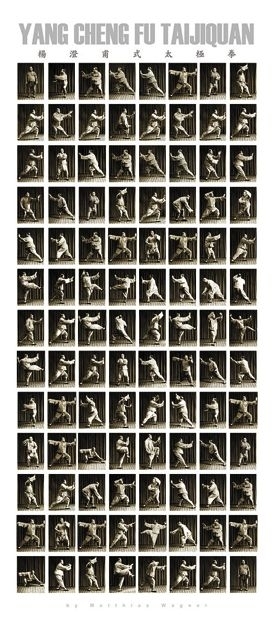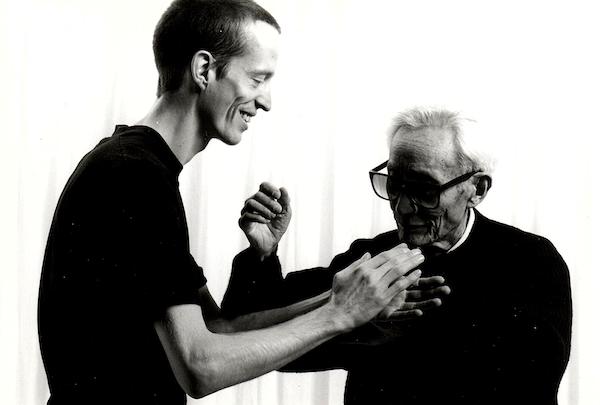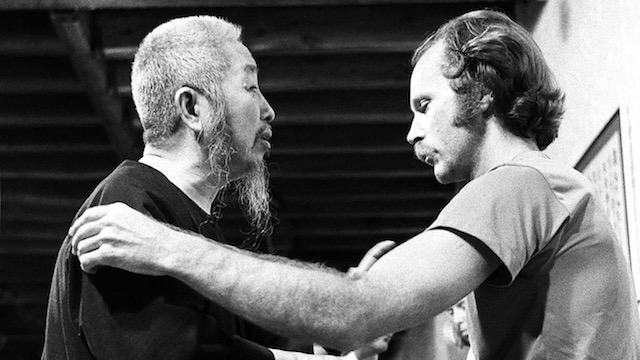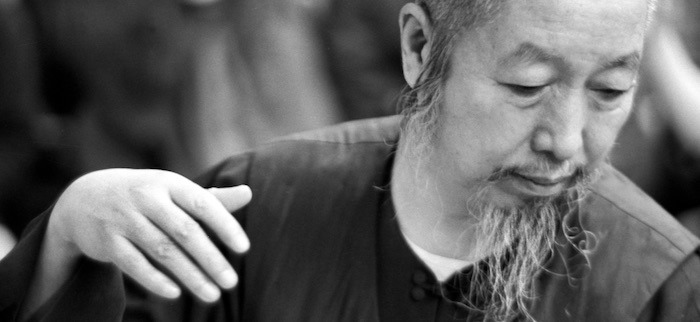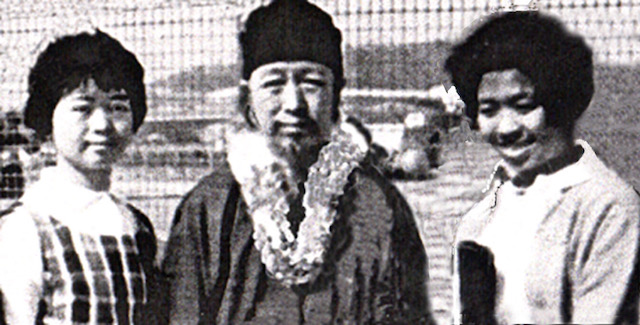My Father by Katy Cheng
My father was born in the last century, well imbued with the traditional Chinese culture. But he was not weighed down by the old. He was open-minded, a tireless teacher, creating new ideas with full enthusiasm and keeping doggedly his principles in those fashion-filled times. After inheriting the past, he was a forerunner for the present, without being contaminated by the new heresies.
My father once wrote a poem:
“Rooted in watery soil, the lotus floats free and pure. Although humble, she surprisingly radiates natural truth. She laughs at my efforts to paint her eternal beauty And breathes her timeless fragrance on the hundred-year-old man.”
My father loved painting lotus. Every birthday he uttered poems and brushed lotus: Sunny lotus, rainy lotus; thousand arrangements at sunrise or sunset; creating an overabundance of beauty. After dinner he often sat with my mother in a little garden house playing chess, both looking elegant and sublime like a celestial couple.
This is a poem of mine in memory of my father:
“Still I see my father’s face, hear his voice, feel his great love. The lotus glows in the sunset’s warm blush, Like a goddess dancing, her silk gown swaying in the wind; Yet, it’s the sweetness of the flower’s fragrance that reminds me of his beautiful poet’s soul.”
In relation with others, he was filial toward his parents, a good responsible man, a faithful husband, open and candid toward his friends, full of righteousness, an untiring teacher nurturing the next generation, a model father.
He taught us Confucius and Mencious Doctrines. He was strict with himself, tolerant of others.
He followed Mencious’ sayings “Not corrupted by riches, not withdrawn on account of poverty, not bent by authority, those are big heroes”.
And he followed Confucius, “I examine myself three times a day. Do I work for people but am I disloyal? Do I make friends but am I distrustful? Do I instruct but not practice?” Father’s words and deeds were endless models for us. He lived a simple, thrifty, but fruitful life. He managed things with order. He never envied nobility; never craved for fame or profit. He taught Madame Chiang painting for 14 years with respectful quietness. In short, he maintained that one’s stature rests with one’s inner worthiness, and he always felt satisfaction from everything, together with a grateful heart.

On his education:
He lost his father while young. Three fires destroyed family property. At ten he suffered a severe head injury. Nevertheless he studied hard regardless of all those tribulations. He encouraged himself with the motto, “Deep and deeper sufferings make higher and higher persons”.
He sought progress endlessly and his talents overflowed. He traveled over mountains and rivers to associate himself with poets and literates. They called him “Southern Genius!” At 14 he was already famous in Shanghai. At 18 he became a professor at Beijing Yu Wen University and School of Arts and Literature. At 25 he was head of the Arts Department, Shanghai Fine Arts College and an instructor at the Literature Department, Kee Nan University.
My father had multiple talents:
he was a poet, calligrapher, painter, martial arts practitioner, and a Chinese medical doctor. He grasped every opportunity to learn and linked all those different kinds of knowledge together with intricate understanding. He excelled on every subject. My countrymen called him “An Elder with Five Excellencies‘”. (Poetry, calligraphy, painting, martial arts, and medicine). My father was well versed in Chinese Traditional medicine. He was a student of then famous Dr. Sung You An. He studied the subject intensely, finishing in only two summers.
He often treated the indigent free of charge, and even paid for their herbal medicine. He served the Chinese Army as a volunteer doctor. He was so good in medicine that people dubbed him “One dose Cheng”; “When the medicine comes, the sickness is gone” I well remember several big wooden plaques that people carried on their shoulders to our house, to honor his medical benefits to others, including one painted by the famous artist Mr. Wu Chang Shuo entitled “Skill with Kindness”.
About his famous martial arts, Tai Chi Chuan:
My father treated Yang Chen Fu’s wife who had been sick for a while. She recovered well and Mr. Yang was very grateful. Now Mr. Yang was of Yang’s lineage, a renowned Tai Chi family. He accepted my father as his “House disciple” and taught him all of the principles of Tai Chi Chuan.
My father, realizing Tai Chi’s health benefits, did not want to keep the secrets to himself. He promoted the martial arts, as a way toward physical fitness, publicly and widely, aiming to make all of China stronger by teaching everybody to practice Tai Chi. He taught us, his children, concentration, moderation, and perseverance through Tai Chi. When he went to France to display his paintings, he took the opportunity to introduce Tai Chi, “The Pearl of the Eastern Culture” to the West. He did it with his universal love to mankind. He continued expanding the martial arts in America, making it a world-wide undertaking.
On community service:

he was a good, law-abiding citizen. His whole life he was altruistic, promoted principles, and took part in community services, intent on helping all of mankind. On the nationwide political field, he declined a senatorial offering, merely accepting an assemblyman’s position. He loved my mother with all his heart. He was so sweet and tender to her! In poetry or in conversation he praised my mother: her virtue, her beauty, her elegance, her wisdom, her self-taught knowledge, her foresight, and her aloofness from worldly success. He really thanked Heaven for giving him such a heavenly companion. He was devoted until they were parted by death. He loved his children, loved his friends, loved the people, and loved God who created the Universe.
My father wrote numerous books about Confucius, treating him fatherly and believing he understood his idiosyncrasies. I once asked him “Since Confucius does not believe in myth or wizards, does he deny God?” He said, “Not quite true. Confucius believes in the Heavenly Father, in a Spirit outside this material world.” And he added, “There is Spirit three feet above us. Everything we do we must face our conscience and face heaven later on. Our Heavenly Father gives us everything. We ourselves have nothing.”
When my mother learnt that I had accepted Jesus in Japan, she was upset. Father quietly led me into his study, and inquired kindly if I really knew the kind of deity I believed in. I said, “Yes. God is the Alpha. God is the Omega. God created and controls this universe. He is the source of Love. His love attracted me. He gave us his only beloved son who died for us. Because Adam and Eve got away from God and committed sin, we all fall into sin. Jesus came to this world and became the sacrificial lamb. We can be with God if only we can accept Jesus’s salvation. I believe in this God, a self-revealed God. More than two thousand years before Jesus was born, God revealed himself in the Bible. He made man to write. He predicted that there would be a Savior born in Bethlehem whose name would be Jesus. Eventually everything happened according to what the Lord predicted.”
After hearing this, Father was delighted and said “Good . Since you already know whom you believe in, and He is mentioned in the Bible, you are not being superstitious. I approve. But remember this: Your future husband, your lifelong companion, must also believe in God. Only through this union of mind and spirit can you two be tied together. I believe there is a God, but I regret I do not have time to study the subject of faith deeply”. Thank God! I know when I described my true belief to my father, the Holy Spirit was with him. “The fear of the Lord is the beginning of knowledge…..” Proverbs1:9.
God gave him knowledge, opened his mind, and filled his heart with Holy Spirit to see through. Thanks to the Lord’s grace and love, he is now resting in the embrace of the Lord. During our Father’s birthday of this year 2000, my Brother Hsu in Taiwan, the editor of my father’s 100th Birthday Anniversary publications, wanted me to write an article about him. I recalled the various facets of his whole life:
Academic study, family management, careers, and faith. In all of these, he was the model across the century.
Through deeds of merit, through his moral ethics, and through his writings – he left footprints in history. Not everybody could have such a good father. I, blessed by God, received his love and heritage ever since I was a child. My tears spill in reminiscence and in gratitude. Now I am the Lord’s child. I can be close to Him everyday, I can grow under His wings. I can seek capability, and learn from His love. “The fruit of the Spirit is love, joy, peace, patience, kindness, goodness, gentleness and self-control” Galatians 5:22,23
I once was and still am proud of my birth father. Now I am proud of my Heavenly Father. He embraces every one of us with his infinite love. Anyone who comes before Him can fall into His embrace, becomes His beloved child, and inherit the gifts He prepared for us before He created the world.
Tai Chi Principle Song-Cheng Man Chings Daughter Katy Cheng
Katy Cheng, Tai Chi-Workshop
Professor Cheng Man Ching Series
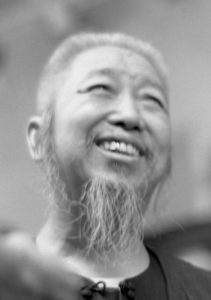
Cheng Man Ching was also named the “Master of Five Excellences“. He was one of the first who taught Taijiquan in the West and his Taijiquan style is spread all over the world. Here you will find many articles about his teaching and how it is taught by his his students.
Cheng Man Ching’s way of teaching (4): On being a masterCheng Man Ching’s teaching was marked by underlining sameness and diversity at the expense of hierarchy and difference. This approach formed the basis of his unique way of bridging the cultural gap between East and West.
Cheng Man Ching’s way of teaching (3): On meditation Our idea of meditation is mainly influenced by two aspects, the visual and the practical aspect. The mind’s uniform picture of a meditating person is someone sitting still in a peaceful environment, in a monastery or on a mountain.
Cheng Man Ching’s way of teaching (2): The Dantian The discussion about the nature of the Dantian is old and it remains unresolved until today: Is the Dantian a bodily, material reality or an ideal concept of Traditional Chinese Medicine to explain certain psychosomatic correlations? The debate cannot simply be described as a conflict between East and West or between Tradition and Modernity.
Cheng Man Ching’s way of teaching (1): “I am not a guru.” Cheng Man Ching, student of Yang Chengfu, came to New York in the 60s, at first teaching Taijiquan in the Chinese community, later also teaching Westerners. Being a university professor from a family of scholars and deeply rooted in traditional Chinese culture, he was confronted with flower children searching for a guru.
Cheng Man Ching on the dao of Taijiquan – a poem Cheng Man Ching is portrayed by his students as an example of total dedication and commitment to the Chinese Arts, especially concerning Taijiquan.
Self-massage as taught by Prof. Cheng Man Ching Cheng Man Ching was known as a master of the five excellences. As a teacher, he taught calligraphy and Traditional Chinese Medicine as well as Taijiquan, Push Hands and sword fencing. Advocating Taijiquan as a method of self-cultivation and health-preservation, he also used to teach his Taijiquan students aspects of other Chinese arts.
Cheng Man Ching Yang style Professor Cheng Man Ching (1900 – 1975) learned Tai Chi Chuan in the tradition of the classical Yang style from Yang Chengfu in Shanghai. There he was close friends with Ma Yueliang, the representative figure of the new Wu style. After the death of his teacher Yang Chengfu in 1935, and with the permission of Chen Weiming, a student of Yang Chengfu, and his father Yang Jianhou, Cheng Man Ching developed the so-called “short form”, in which 37 positions are counted, from the the well-known long form with 85 or 108 positions, depending on how they are counted.
Author: Katy Cheng
Images: Ken van Sickle and Taiji Forum
